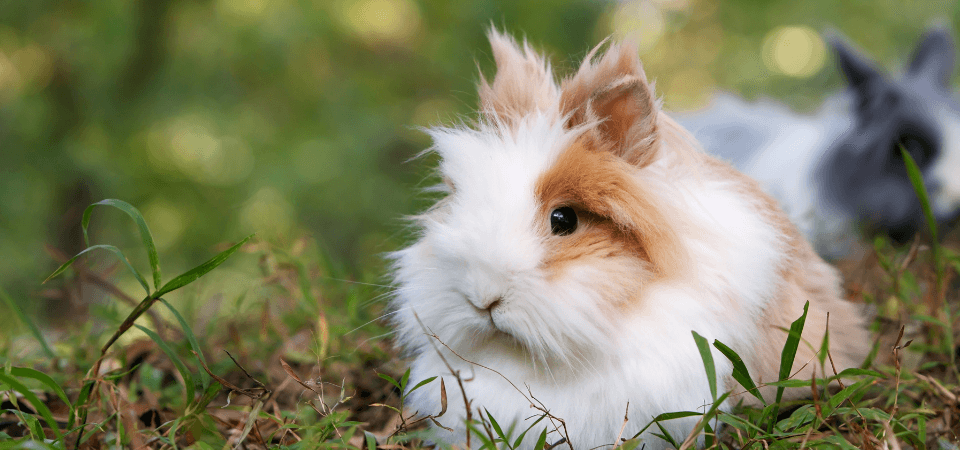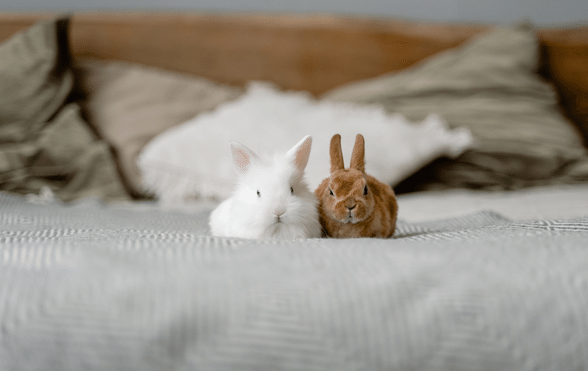Vet expert Dr. Sophie Bell discusses the issue of Gut Stasis. She explores causes, the most common symptoms and the main preventative methods.
Is your rabbit insured? Get a quote for £2,000 of vet fee cover | Insure up to 3 pets per policy | We’ve been insuring exotic pets since 1996 | Check out our customer reviews on Feefo.
Rabbits require regular monitoring when it comes to their food intake. Dental problems, incorrect diet, stress and other underlying health problems can lead to refusal of food, known as anorexia. This in turn can result in complications such as gut stasis.

Getting to grips with Gut Stasis
What is Gut stasis?
Gastrointestinal or gut stasis is a condition where the normal bacteria found in the digestive tract becomes unbalanced. This results in a reduction in contractions of the stomach and intestinal muscles.
It can cause rapid deterioration of your bunny’s health and if left untreated, is likely to result in death.
It is painful and your rabbit will look bloated due to the production of gas from the ‘bad bacteria’.
Diet, hydration, exercise, stress and obesity can all play a role in its development.
Symptoms of Gut Stasis
- Teeth grinding – known as bruxism
- Diarrhoea and/or soft faeces
- Lack of faeces or abnormally small faeces
- Lethargy and depression
- Anorexia
- Heavy and/or rapid breathing
- Bloated abdomen
- Hunched position
- Grunting
- Your vet will hear reduced gut sounds
Treatment of Gut Stasis
Gut stasis needs to be addressed urgently. Often rabbits are dehydrated, some will need hospitalisation to receive intravenous fluids, others may be treated via oral solutions such as diluted fruit juice, offered fresh greens and syringe fed with critical care.
The condition is painful so your bunny will be given pain medication. If nursing them at home is advised by your vet, you will be sent home with the pain medication to give orally, alongside medications to increase gut motility. These typically include metoclopramide.
It may be a good idea to create a chart to note medication and syringe feeding times, note how many poos are being produced (if any) and record any food they take by themselves.
Keep them warm and return to the vets if you are concerned. Some rabbits will need to be fed via a tube, in this case they will be hospitalised.
Chamomile tea can be an excellent addition to your rabbit’s treatment regime. It can help with anxiety with its soothing effects and can also help with gastrointestinal issues including gut stasis.
It is naturally caffeine free and can be mixed in with the syringe fed food and/or offered as a drink. When making it, allow the tea to brew and place a saucer on top of the cup. Make sure it has cooled down before offering.
Always ask your vet if you are unsure.
How to prevent Gut stasis
-
- Feeding hay to prevent Gut Stasis
Focusing on your rabbit’s diet is important. Plenty of roughage is essential and hay provides a great source.
It helps with dental health, reducing overgrowth of teeth which in turn can lead to anorexia. It helps with the passage of hair which can cause a blockage if not eliminated and it also provides optimal conditions for the growth of good bacteria.
-
- Diet and digestion preventing Gut Stasis
Rabbits cannot vomit so an impaction of food or hair can only come out one-way. High fibre diets play a huge role in digestion.
Alongside hay, providing dark leafy greens such as kale, grass and herbs that are safe for your bunny is important. Offer sugary fruits as an occasional treat only as they can cause obesity.
As diet plays an important role in preventing Gut Stasis, read our rabbit diet article here.
-
- Hydration in preventing Gut Stasis
Providing fresh drinking water is a must, keeping your rabbit well hydrated will help keep the guts moving.
Providing a water bowl, rather than a drinking bottle is often preferred by many rabbits. Careful attention will need to be made to ensure it is fresh, clean and free of old food.
-
- Space and exercising to help prevent Gut Stasis
Rabbits should have access to a large and safe exercise area. Movement will help keep the guts functioning as they should and prevent obesity. Lack of movement can lead to numerous health problems along with affecting the gut and its motility.
-
- Probiotics for rabbits
Adding a daily probiotic to your bunny’s diet can help enormously with digestion. Probiotics support the good bacteria found in your rabbit’s gut and minimises bad bacteria, which can produce gas leading to painful bloating.
Bad bacteria can release endotoxins which can cause a rapid decline in your rabbit’s health and death if untreated.
-
- Rabbit relaxation and wellbeing
Stress and pain can lead to anorexia and a change in gut bacteria, which can ultimately lead to gut stasis.
Be sure to reduce anything that is causing your bunny stress and take them to the vet immediately if you think they are in pain.
-
- Get your rabbit a friend
Companionship is an important factor for a rabbit’s well-being, having a rabbit friend allows them to communicate, work, play and look out for each other.
Giving your rabbit a friend can then help reduce stress and improve their overall health
Prevention is best way to avoid Gut Stasis
Choosing a healthy diet that includes lots of hay and grass, minimising stress and ensuring your rabbit has a bunny friend is important.
You should also provide plenty of fresh water, exercise and consider probiotics.
Finally, it’s a good idea to keep a critical care supply at home in case your rabbit is unwell, and you’re unable to get emergency vet access. This will enable immediate syringe feeding.
Is your rabbit insured? Get a quote for £2,000 of vet fee cover | Insure up to 3 pets per policy | We’ve been insuring exotic pets since 1996 | Check out our customer reviews on Feefo.
Own a cat or dog? Get pet insurance that covers up to £12,000 for dogs and £9,000 for cats in vet fees every year, including dental for illness and accidents with British Pet Insurance.

